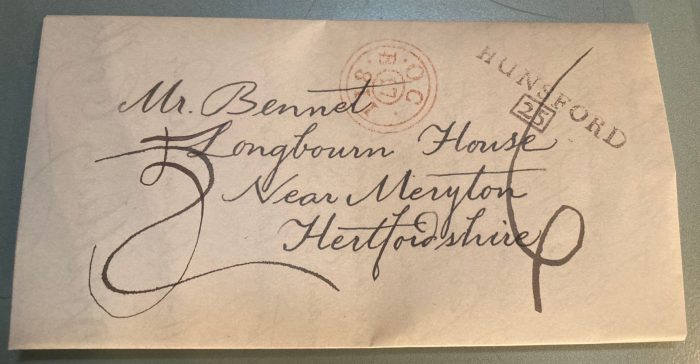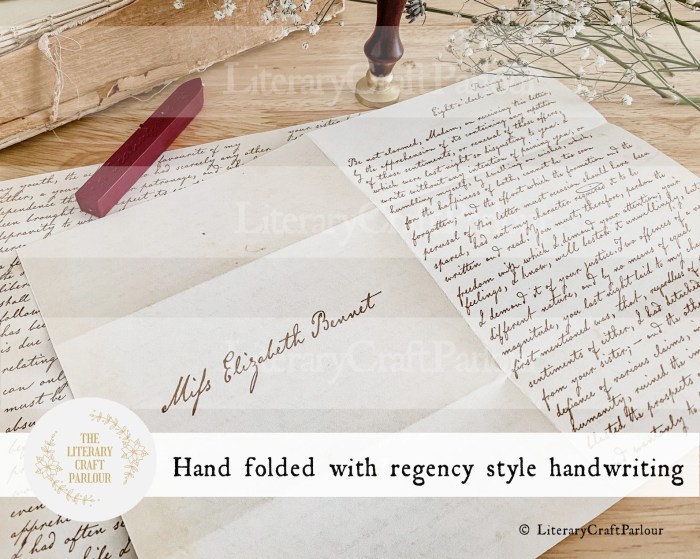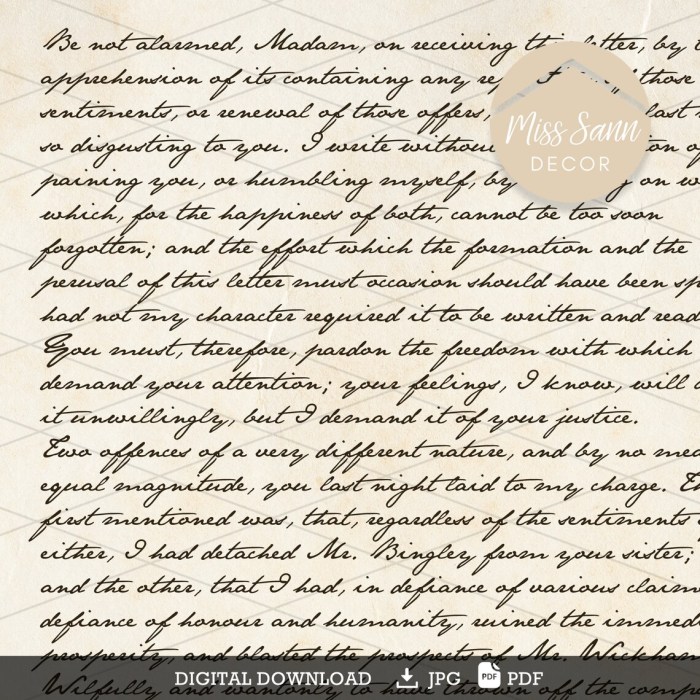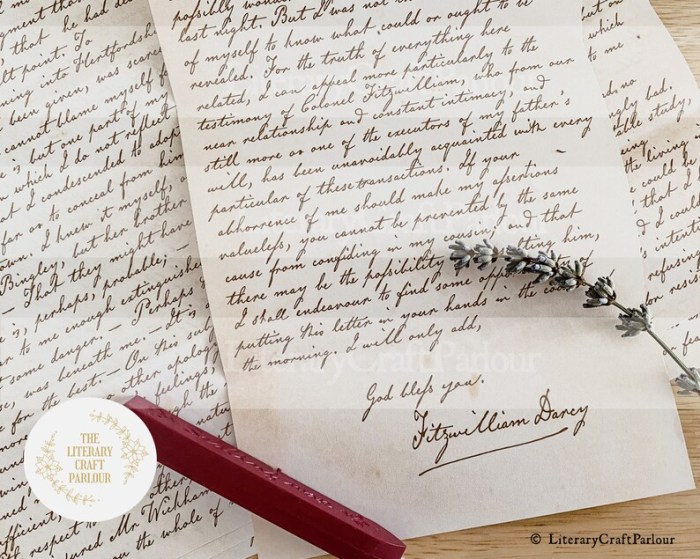In the annals of romantic literature, the letter from Darcy to Elizabeth stands as a testament to the power of language and the complexities of human emotion. Jane Austen’s iconic creation, this letter unveils the heart of Mr. Darcy, a character whose pride and prejudice are both his greatest flaws and his most endearing qualities.
Through an analysis of the letter’s structure, style, and themes, we embark on a journey into the mind of one of literature’s most beloved characters, exploring his motivations, emotions, and the profound impact his words have on the course of Elizabeth Bennet’s life.
Understanding the Context

The letter from Darcy to Elizabeth is a pivotal moment in Jane Austen’s novel “Pride and Prejudice.” It provides a deeper understanding of Darcy’s character and his feelings for Elizabeth Bennet.
Historical and Social Context
The novel is set in Regency England, a period of social and economic change. The landed gentry, like Darcy, held significant power and influence, while the middle class, like the Bennets, were rising in prominence. Marriages were often arranged for financial or social gain, and women had limited rights and opportunities.
Characters and Relationship
Darcy is a wealthy and proud landowner. Elizabeth is an intelligent and independent young woman. Their initial encounters are marked by misunderstandings and prejudice. Darcy’s proposal to Elizabeth is initially rejected due to his pride and her belief that he does not truly respect her.
Structure and Style

Darcy’s letter to Elizabeth is a complex and carefully crafted piece of writing that demonstrates his intelligence, wit, and sensitivity. The structure of the letter is highly organized, with a clear introduction, body, and conclusion.
The introduction begins with a formal greeting and immediately establishes the purpose of the letter: to explain Darcy’s actions and feelings towards Elizabeth. Darcy then proceeds to Artikel the main points of his argument in a clear and concise manner.
Body
The body of the letter is divided into three main sections. In the first section, Darcy addresses Elizabeth’s accusations of pride and prejudice. He admits that he was initially prejudiced against her due to her family’s lower social status, but that he has since come to realize that she is a woman of great intelligence and virtue.
In the second section, Darcy explains his reasons for separating Jane and Bingley. He reveals that he was motivated by a desire to protect his friend from a marriage that he believed would be unhappy. Darcy acknowledges that his actions were misguided, but he insists that he acted with the best of intentions.
In the third section, Darcy declares his love for Elizabeth. He tells her that he has been deeply in love with her for some time, but that he has been hesitant to express his feelings due to her prejudice against him.
As I pen this letter to you, my dearest Elizabeth, my thoughts cannot help but wander to the practicalities of life. Does the FHA, for instance, require radon testing in homes? This is a question that has been weighing on my mind, as I am ever concerned with the well-being of my family.
Rest assured, my love, that I shall soon return to the more romantic matters at hand.
Conclusion
The conclusion of the letter is brief and to the point. Darcy asks Elizabeth to forgive him for his past actions and to accept his proposal of marriage. He assures her that he will do everything in his power to make her happy.
Language and Style
The language and style used by Darcy in the letter is formal and polite, but it is also passionate and sincere. Darcy uses a variety of rhetorical devices, including metaphors, similes, and hyperbole, to convey his feelings and to persuade Elizabeth of his sincerity.
Darcy’s tone is respectful and deferential, but he also does not hesitate to express his own opinions and feelings. He is clearly a man of intelligence and wit, but he is also capable of great humility and vulnerability.
Darcy’s Characterization

Darcy’s letter to Elizabeth Bennet offers a glimpse into his complex character. Through his words, we can discern his motivations, emotions, and personality traits, revealing a man who is both prideful and honorable, arrogant yet vulnerable.
Pride and Prejudice
Darcy’s pride is evident throughout the letter. He repeatedly asserts his superiority to Elizabeth, both in terms of social status and personal qualities. However, his pride is not without its vulnerabilities. When he realizes that Elizabeth has rejected his proposal, his pride is deeply wounded, and he struggles to reconcile his self-image with her rejection.
Honor and Integrity, Letter from darcy to elizabeth
Despite his pride, Darcy possesses a strong sense of honor and integrity. He is determined to rectify his past wrongs, and he does so by apologizing to Elizabeth for his previous behavior. His apology is not merely a matter of words; he demonstrates his sincerity by changing his behavior and treating Elizabeth with respect.
Arrogance and Vulnerability
Darcy’s arrogance is evident in his initial interactions with Elizabeth. He dismisses her as being beneath his notice, and he treats her with disdain. However, as he comes to know her better, he realizes that his initial judgment was wrong.
Elizabeth’s intelligence, wit, and spirit gradually win him over, and he finds himself falling in love with her.
Darcy’s vulnerability is most evident in his confession of love to Elizabeth. He risks everything by admitting his feelings, and he does so with humility and sincerity. His vulnerability is a testament to the depth of his love for Elizabeth, and it ultimately leads to her acceptance of his proposal.
Elizabeth’s Perspective

Upon receiving Darcy’s letter, Elizabeth is likely to experience a range of complex emotions. Initially, she may be shocked and surprised, as she has never considered Darcy to have any romantic interest in her.
Elizabeth’s Changing Perception of Darcy
Darcy’s letter forces Elizabeth to confront her previous prejudice against him. She had initially judged him as arrogant and conceited, but his letter reveals a different side to his character. Elizabeth begins to see that Darcy is not the heartless and selfish man she had believed him to be.
- Darcy’s apology for his previous behavior shows that he is capable of remorse and humility.
- His explanation of his reasons for separating Jane and Bingley reveals that he has a strong sense of responsibility and family loyalty.
- His declaration of love for Elizabeth is sincere and passionate, suggesting that he is not merely seeking a convenient marriage.
As Elizabeth reads Darcy’s letter, her feelings towards him gradually shift from resentment to respect and even admiration. She begins to appreciate his intelligence, his integrity, and his genuine affection for her.
Themes and Motifs
Darcy’s letter to Elizabeth is a complex and nuanced piece of writing that explores several important themes and motifs. These include:
- Pride and Prejudice:The letter is a classic example of the conflict between pride and prejudice. Darcy’s initial pride and prejudice against Elizabeth are gradually overcome by his growing affection for her. Elizabeth’s own prejudice against Darcy is also gradually overcome as she comes to understand his true character.
- Love and Marriage:The letter is also a meditation on the nature of love and marriage. Darcy’s love for Elizabeth is passionate and sincere, but it is also based on mutual respect and understanding. Elizabeth’s love for Darcy is more gradual, but it is just as deep and meaningful.
- Social Class:The letter also explores the theme of social class. Darcy is a wealthy and aristocratic landowner, while Elizabeth is the daughter of a country gentleman. Their different social backgrounds create a barrier between them, but it is ultimately overcome by their love for each other.
- Reputation:The letter also explores the theme of reputation. Darcy’s reputation as a proud and arrogant man precedes him, and it is a major obstacle to Elizabeth’s acceptance of his proposal. However, Darcy’s true character is gradually revealed to Elizabeth, and she comes to see that he is not the man she thought he was.
These themes and motifs are all interconnected and they work together to create a rich and complex story about love, marriage, and social class. Darcy’s letter to Elizabeth is a classic example of the epistolary novel, and it is a powerful and moving story that continues to resonate with readers today.
Historical Significance

Darcy’s letter to Elizabeth holds immense literary and cultural significance. It is widely regarded as a pivotal moment in the development of the romance novel genre, setting a precedent for the passionate and eloquent expression of romantic sentiments.
Impact on Romance Novels
- Emotional Depth:Darcy’s letter established a new level of emotional depth in romance novels, demonstrating the complexities of human emotions and the power of love to overcome societal barriers.
- Written Expression:It showcased the importance of written expression in conveying romantic feelings, influencing the use of passionate and eloquent language in subsequent romance novels.
- Pride and Prejudice:The letter became an iconic element of Jane Austen’s Pride and Prejudice, helping to establish the novel as a classic in the genre.
Adaptations and Interpretations: Letter From Darcy To Elizabeth

The letter from Darcy to Elizabeth has been adapted and interpreted in various media, including literature, film, and television. These adaptations have influenced our understanding of the original work by providing different perspectives on the characters and their motivations.
Literature
Jane Austen’s novel has been adapted into numerous literary works, including sequels, prequels, and spin-offs. These adaptations often explore different aspects of the original story, such as the perspectives of other characters or the events that led up to the letter’s writing.
For example, in P.D. James’s 2008 novel “Death Comes to Pemberley,” the letter is used as a plot device to introduce a murder mystery set at Pemberley, Darcy’s estate.
Film and Television
The letter has also been adapted into several films and television series. The 1995 BBC miniseries “Pride and Prejudice” features a scene in which Darcy reads the letter aloud to Elizabeth, while the 2005 film adaptation starring Keira Knightley and Matthew Macfadyen includes a scene in which Elizabeth reads the letter in private.
These adaptations have brought the letter to life for audiences and helped to shape our understanding of the characters and their relationship.
Frequently Asked Questions
Who wrote the letter from Darcy to Elizabeth?
The letter was written by Jane Austen, the author of Pride and Prejudice.
What is the main purpose of the letter?
The main purpose of the letter is to explain Darcy’s feelings for Elizabeth and to propose marriage to her.
What is Elizabeth’s initial reaction to the letter?
Elizabeth’s initial reaction to the letter is one of shock and disbelief. She is unable to believe that Darcy could have any feelings for her, given his previous behavior towards her.